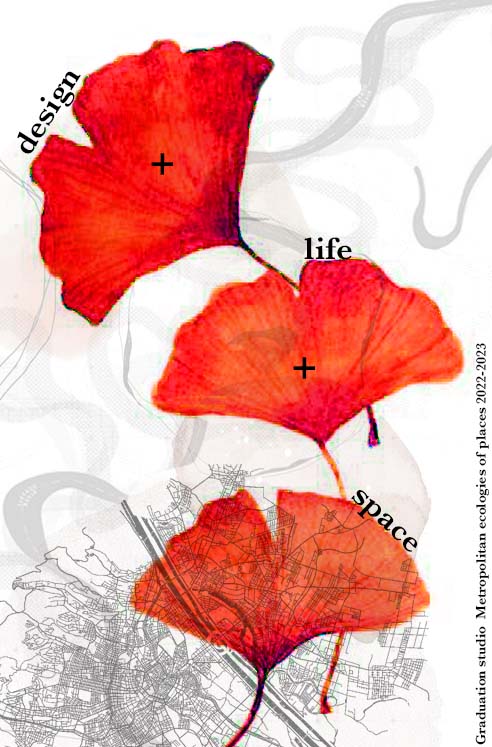Metropolitan Ecologies of Places
“Ultimately, we wanted to give every species at the table the level of love, care and attention we give to ourselves- humans” Supefluxus 2022
The studio metropolitan ecologies of places (MEP) embraces the ecological and socio-economic transition as a field of critical and imaginative investigation, having at its core the relationship between Design Space and Life. Engaging with notions of transformation, reuse, regeneration, reparation, and transition of habitats and ecologies, the studio deploys the design specifically in regenerative and biophilic design theory and approach across scales.
Climate change, with rise of temperatures and extreme events, Covid 19 pandemia and the recent international geopolitical tensions are currently defining a new socio-economic and environmental conditions. These new conditions ask for a redefinition of how urban territories and landscapes work and function.
Today, Urban and Landscape Design have acquired a new meaning and urgency to address these challenges. From drivers of progress to the source of planetary hazards, the design of the built and the unbuilt environment and its related processes is being recast in the public sphere. The general concern on resource scarcity and climate change effect on the territories, the growing social movements and climate activism are reflected directly in urban and territorial space, demanding exploration of alternative imagenerias, strategies and tools to support a sustainable transition of the built environment.
The imminent future of the urban engages social and environmental imaginaries, extending beyond the city and the human. The graduation studio assumes the role of landscape and urban design as a crucial means of synthesis that can inspire and negotiate change in science, practice and governance.
Studio approach and methods
Informed by Environmental Technology & Design, Spatial Planning & Landscape Architecture theory & research, the studio explores, through design representation and systemic thinking, alternative and contrasting pathways of unfolding the complexity of the urban landscape and constructing new imaginaries and strategies. Within the scope of the MEP studio, students develop their own design projects based on their strong personal motivation. The projects can vary from urban areas, landscapes and regions to redesign of process and supply chains. Starting from a solid theoretical framework translated into a set of explorative representation techniques, students learn how to produce original knowledge through a Research-Informed Design approach. Designing metropolitan environments from an ecological perspective requires a combination of methods from different scientific disciplines with a creative design process: a systemic thinking.
Staff
Prof.dr.ir. A. van Timmeren, dr. Alexander Wandl, dr. Cecilia Furlan, dr. Daniela Maiullari, dr. Daniele Cannatella, ir. Kristel Aalbers, Luca Iuorio, dr.ir. Marjolein van Esch, Martijn Lugte, ir. Michiel Brouwer, dr.ir. Nico Tillie, dr.ir. Remon Rooij, Dipl.-Ing. Ulf Hackauf.
